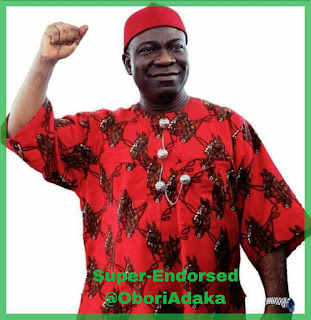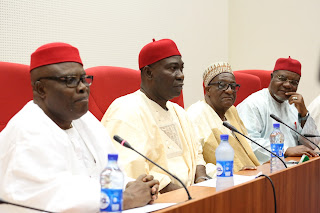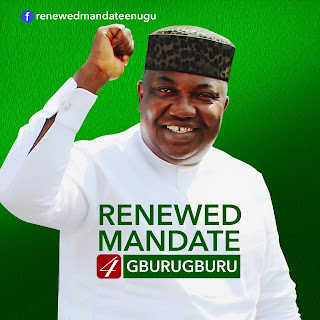@OBORIADAKA ENDORSES THE INTELLECTUAL POLITICAL THINKER OF OUR TIME: SEN. PROF. IKE EKWEREMADU PH.D., CFR, FOR ENUGU WEST

The stark difference between the executive and legislative arms of government lies in term limit. The executive is limited to two 4 year term. The legislators are the true representatives of the people who make the laws guiding them and providing oversight functions on the activities of the executives. Common sense tells us that the more you do something the better you get at it. This is the essence and reason for not providing for term limit in the constitution for the lawmakers who apply their experience of lawmaking in shaping a better society.
Having browsed the 2019 political landscape, @OBORIADAKA endorses Senator Professor Ike Ekweremadu, Ph.D, CFR for continued representation of Enugu West Senatorial district not for bore holes, not for roads and other attending infrastructures his legislative prowess has already provided to Enugu West rather we are recognizing his growth as a lawmaker who started as a senator, became Deputy Senate President and Speaker of ECOWAS Parliament, obtained a doctorate degree in Law and moved on to become a Professor of Law as he authored numerous articles and books. Senator-Professor Ekweremadu's intellectual political thinking, his experience in the legislature, and his ranking status are the panacea for better laws including but not limited to making laws that would eventually restructure NIGERIA and place the country on the path to true federalism. To buttress our position please read a piece below by one of our members discussing Senator-Professor Ekweremadu's intellectual cum legislative accomplishments.
-------------------------------------------
The best evidence of how good one is at doing anything is to actually see them doing it. Similarly, a politician’s ability to flourish in the walls of intellectualism is to see him or her doing so. Even though, it has been postulated that intellectuals do not necessarily make good politicians however, it is important for political leaders to have broad idea and interest in communicating and reading at intellectual level in order to remain effective. What we have not really explored are the effectiveness of politicians who turned intellectuals as we are about to witness, however, there could be some benefits to it in the political sphere of Nigeria.
In his Opinion Pages, Gary Gutting, a professor of philosophy at the University of Notre Dame, described intellectual as someone seriously devoted to what used to be called the “life of the mind”: thinking pursued not for instrumentally, for the sake of practical goals, but simply for the sake of knowing and understanding. However, a thinker grows to become public intellectual when he or she participates in public discourse and develops the ability to connect scholarly research to the practical solutions to societal problems. This piece will examine the rising intellectual curiosity of one of the political giants of our time and his contributions so far in the ominous debate and discourse of Nigeria’s emerging democracy and political development.
Back in 2014 when I received a notification to attend a public lecture by the number five citizen and the Deputy Senate President of Nigeria, His Excellency, Dr. Ike Ekweremadu CFR at the prestigious John Hopkins University’s School of Advanced International Studies (SAIS) Washington DC, on the efforts, so far, to reform Nigeria’s constitution, I was not prepared for what my unusual self-invitation to a public lecture by a politician would lead to; neither was I aware that one could encounter such breadth of experience, mastery of subject matter cum intellectual depth, political sagacity and deep sense of what is good for Nigeria throughout the course of the lecture. Little did I know that the maiden errand to seek resolution to the then political impasse engulfing Enugu West Senatorial zone would metamorphose into a followership of a political giant flowing in intellectualism - a rare combination in Nigeria.
Such followership which started at John Hopkin’s lecture has since taken me to the launching of his book titled, ‘Constitutional Review in Emerging Democracy: The Nigerian Experience’ in Abuja, and to yet another lecture organized by the Faculty of law, Nnamdi Azikiwe University, Awka titled, ‘The Politics of Constitutional Review in the Multi-Enthnic Society’. It is of note that my followership led me to only 3 of his 19 intellectual parlay however the substance of each outing continues to grow both in breadth and depth. As I write I am in a possession of a special invitation to a recent intellectual feat, the launching of another book in Abuja titled, ‘Who Will Love My Country: Ideas for Building the Nigeria of Our Dreams’ authored by the Deputy President of the Senate, His Excellency, Dr. Ike Ekweremadu.
At John Hopkin’s Dr. Ekweremadu gave insight of his experience leading to the successful constitutional amendment process in 2010 as Chairman of Constitution Review Committee, after failure at the previous years of 2003 and 2006. He enumerated factors militating against passage of amendments as political inexperience, ethnic bias and lack of political will by most stakeholders. He lamented the ugly situation whereby the Houses of Assembly voted against their very own financial autonomy because they are afraid the governors.
Furthermore, Dr. Ekweremadu proposed the adoption of a single term limit for transition period of 30 years for political culture to mature, and as solution to the crisis of leadership succession at all executive levels. He suggested that the ministers be subjected to giving stewardship of their services to the parliament in a system where the non-performing ministers get vote of no confidence and subject to being removed from office. On relationship between states and local governments, Dr. Ekweremadu proposed adopting the Canadian model where there is no autonomy for local governments rather they are under the full control and structures of the states who determine the number and funding of local governments.
The Deputy Senate President zeroed in on policing and called for the decentralization of police in Nigeria. He added that the prevalent trend in crime-fighting and the realities of security challenges in many countries make the decentralization of police inevitable. He opined that decentralized police would provide opportunities for community policing where the police officers have the advantage of knowing all aspect of their communities better than the criminals. He argued that decentralized policing would not lead to abuse by state governments as such argument is quite untenable as the decentralized police will be monitor by an Independent Police Service Commission.
In his book titled, Constitutional Review in an Emerging Democracy, Dr. Ekweremadu identifies structures, processes and strategies that have enhanced constitution amendment exercises in Nigeria as it chronicles the manner in which the National Assembly has robustly nurtured and managed Nigeria’s complex, contentious and multifaceted constitutional reform process. He argued that unfortunately less emphasis has been placed on the process of constitution making rather more is placed on content of the constitution. He added that the constitution is a legal document and is dynamic, just as the society itself is dynamic necessitating constitution making a continuous process. Therefore, his new book provides an important intervention to address the gap between constitution making and content of constitution as it provides international and national actors with new perspective and perhaps practical guidance on designing and implementing constitution amendment processes as well as preserving the institutional memory and guide to future amendments. Finally, the Deputy President of Senate reminded us that constitution amendment, nation building and democracy are working in progress.
In another outing in a lecture at the Faculty of Law, Nnamdi Azikiwe University, Dr. Ekweremadu was bold in defending the federal character as he called out the present administration as a violator of section 14 of the constitution. He added that the appointments made so far clearly are lopsided leaving the South-East totally empty-handed. He cautioned that “a country as ours that just recovered from the most divisive and bitter fought presidential election in its history; a country where vicious civil war has been fought and scars are fresh; a country where a presidential election, believed to have been won by someone from a part of the country was annulled; a country which has deteriorated from one that citizens held high political and civil service offices outside their places of origin to one in which they hardly do so anymore; and indeed a country where there has been consistent outbreaks of militancy and restiveness by people who believe they have been shortchanged, maltreated and therefore, better off outside the Nigerian commonwealth, I firmly believe from the depth of my heart and conscience that you do not even need a soothsayer or compulsion of the constitution to know that you must necessarily carry every part of the country along”.
Furthermore, Dr. Ekweremadu reiterated the need for creation of more states in the South East for the sake of equity in the distribution of resources and opportunities. However he pointed out that creating extra state required political solution and understanding as the military had planted stumbling blocks in the constitution. He added that creating a state in Nigeria by the provisions the Section 8 of the constitution is like passing a camel through the eye of a needle as the military locked the structure of the country the way they wanted and threw away the keys in the Atlantic Ocean
In Nnamdi Azikiwe University, Awka, Dr. Ekweremadu noted among other issues that the difficulties in amending the constitution were caused by mutual suspicion of the elite as mutual enthno-sectional and religious suspicions have become so ingrained in our body polity that even the most patriotic and altruistic intentions are almost always interpreted from myopic prisms of such sentiments and interests. This is the real problem of Nigeria where equity, fairness and justice is alien to body polity as the country is badly structured to benefit of a particular ethnic group at the detriment of others.
As the intellectual journey anchor on his latest feat, a glance at the title of his new work, ‘Who Will Love My Country’, provides practical solutions significant to the political and social development of Nigeria. Nigeria can only be great again unless the cobwebs of injustice, marginalization and unfairness are erased from the body polity. Dr. Ekweremadu noted that much as the Federal Character had played important role in fostering national unity and promoting cross-cultural interactions, its abuse and exploitation has sacrificed merit on the altar of mediocrity in the leadership and recruitment process. He argued that the abuse of the Federal Character principle was in part responsible for Nigeria’s retarding progress over the years. He calls for a drastic reform of the principle, especially in the public sector recruitment for the country to make meaningful progress.
Moreover, he reiterated that “Ethnicity is a reality in Nigeria and people would have to be irrational or willfully blind not to care about it. However the champions of the Federal Character use it to rather uplift mostly their kith and kin at the expense of the larger population in their own ethnic group. He noted that those who engage in this conduct increase the polarization of Nigerians along ethnic lines by redefining federal character to include hiring unqualified and clearly unsuitable people just because of their ethnic origin. The 159 page book has commentaries and discussions about other topics such as the electoral process, party politics, revamping of public institutions, corruption and poverty reduction. This is book is poised to fill the vacuum of knowledge especially for young and upcoming politicians who still hold hope for the geographical expression called Nigeria - Grab a copy.
In conclusion, Prof. Gutting reminded us that intellectuals tell us things we need to know: how nature and society work, what happened in our post, how to analyze concepts, how to appreciate art and literature. They also keep us in conversation with the great minds of our past. This conversation may not, tap into enduring wisdom but at least it provides a critical standpoint for assessing the limits of our current cultural, economic, political assumptions. Following His Excellency, Dr. Ekweremadu’s public intellectual path, his lecture series, and his books, it is obvious to note that he is walking in the right direction. He is providing the critical standpoint for assessing our political assumptions as he engages in scholarly discourse, engaging in the lifelong process of learning and sharing perspectives, ideals and experiences. Intellectuals may not make good politicians however this particular politician-turned-intellectual, who has more than basic understanding of how experts in various fields think, and who is making waves today at his book launch, could be who Nigeria really needs to survive.
Dr. Udeh, an adjunct professor at Southern New Hampshire University, member of @OBORIADAKA Think-Tank, Stakeholder PDP Egede-Umoka Ward, former Aspirant for Federal House of Rep. Udi-Ezeagu Constituency, writing from Egede, Udi LGA.






Comments
Post a Comment